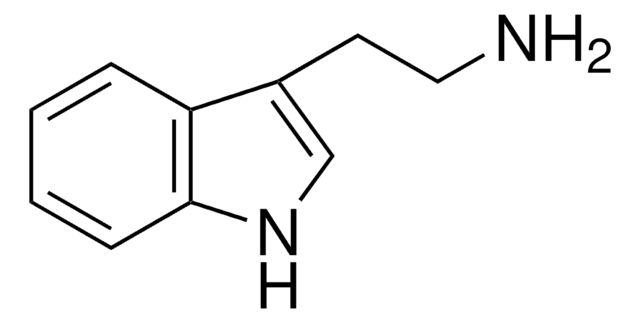33211
Cadaverine
purum, ≥97.0% (GC)
Synonym(s):
1,5-Diaminopentane, 1,5-Pentanediamine, Pentamethylenediamine
About This Item
Recommended Products
grade
purum
Quality Level
Assay
≥97.0% (GC)
form
liquid
refractive index
n20/D 1.458 (lit.)
n20/D 1.458
bp
178-180 °C (lit.)
mp
14-16 °C (lit.)
solubility
1 M HCl: soluble 0.5 g/10 mL, clear, colorless
density
0.869 g/mL at 20 °C
0.873 g/mL at 25 °C (lit.)
functional group
amine
SMILES string
NCCCCCN
InChI
1S/C5H14N2/c6-4-2-1-3-5-7/h1-7H2
InChI key
VHRGRCVQAFMJIZ-UHFFFAOYSA-N
Looking for similar products? Visit Product Comparison Guide
General description
Application
Signal Word
Danger
Hazard Statements
Precautionary Statements
Hazard Classifications
Eye Dam. 1 - Skin Corr. 1B
Storage Class Code
8A - Combustible corrosive hazardous materials
WGK
WGK 3
Flash Point(F)
143.6 °F - closed cup
Flash Point(C)
62 °C - closed cup
Personal Protective Equipment
Regulatory Listings
Regulatory Listings are mainly provided for chemical products. Only limited information can be provided here for non-chemical products. No entry means none of the components are listed. It is the user’s obligation to ensure the safe and legal use of the product.
FSL
Group 4: Flammable liquids
Type 2 petroleums
Hazardous rank III
Water soluble liquid
JAN Code
33211-VAR-F:
33211-10ML-F:
33211-BULK-F:
33211-INTR-F:
33211-50ML-F:
Choose from one of the most recent versions:
Certificates of Analysis (COA)
Don't see the Right Version?
If you require a particular version, you can look up a specific certificate by the Lot or Batch number.
Already Own This Product?
Find documentation for the products that you have recently purchased in the Document Library.
Customers Also Viewed
Our team of scientists has experience in all areas of research including Life Science, Material Science, Chemical Synthesis, Chromatography, Analytical and many others.
Contact Technical Service








